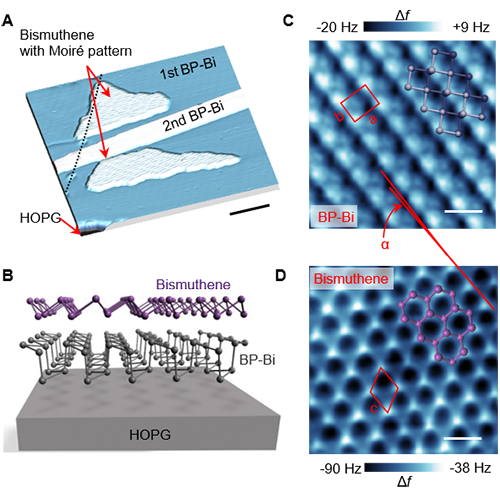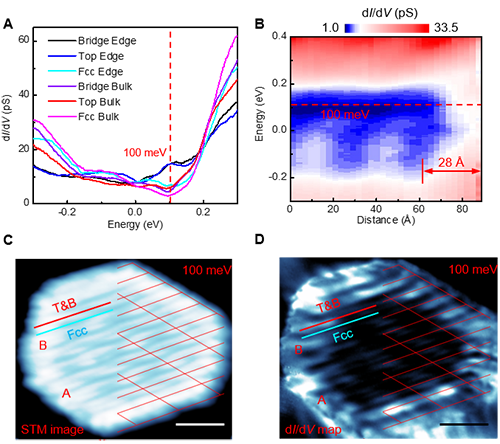Scientists realize the modulation of topological edge states in twisted bismuthene homojunctions through Moiré superstructure
Date:04-06-2020 Print
Scientists from the Institute of Physics (IOP) at Chinese Academy of Sciences, working with colleagues at National University of Singapore, have successfully realized the modulation of topological edge states in twisted bismuthine homojunctions through Moiré superstructure, which has potential applications in nano electronics and quantum computing.
A two dimensional (2D) topological insulator (TI) is an insulating 2D material, but whose electrons are allowed to move along its edges. 2D TIs are promising candidates for spin electronics and devices with minimal/negligible energy dissipation, which will be applicable in quantum computers and ultra-low energy electronic devices. However, the fabrication of robust TIs and the reliable tuning of their topological states are challenging. In particular, 2D bismuthene (bismuth monolayer with a honeycomb atomic structure) is predicted as the best candidate for a 2D TI, but the preparation of free-standing modes in a single layer bismuthene has still not been realized, due to the strong influence of the substrate on the topological states.
Recently, Prof. Lan Chan and Prof. Kehui Wu from IOP, cooperating with Prof. Andrew Wee from NUS, successfully synthesized a bismuthene homostructure using molecular beam epitaxy (MBE). They found a single layer of bismuthene can be grown on a single layer of black-phosphorus-like bismuth layer (BP-Bi) to form a vertical homostructure with different rotation angles between the two layers, which forms Moiré superstructure. As the two layers in the homostructure have different atom arrangements, the interlayer interactions between these two layers are observed to be largely reduced and periodically modulated. More importantly, they found the topological edge states of bismuthene is also tunable as the periodically modulated interface interactions.
Moiré superstructure forms when a periodic lattice is overlaid on another similar lattice, typically at a small relative rotation angle. Using the moiré pattern formed by rotating two 2D materials relative to each other can potentially control performance of devices based on 2D materials.
The bismuthene homostructure realized in this work provides a novel paradigm that twisted stacking mode with the decoupled interlayer interactions can help to preserve the intrinsic topological property in a single layer bismuthene. It also proposes a new prototype to controllably tailor the topological edge states for quantum device applications.
This study entitled “The Effect of Moiré Superstructures on Topological Edge States in Twisted Bismuthene Homojunctions” was published in Science Advances on 3 June 2020.
This work was supported by the National Science Foundation, the Ministry of Science and Technology of China, the Chinese Academy of Sciences, the Beijing Natural Science Foundation and the NRF of Singapore.

Fig. 1. The topographic images (A,C,D) and schematic (B) of bismuthene/BP-Bi homostructure.

Fig. 2. DFT calculations of bismuthene/BP-Bi moiré superstructure (A, B) and corresponding interlayer parameters (C). STM (D) and qplus AFM image (E) of the same structure as shown in (B). Experiment measurements of surface buckling (F) and the comparison with theoretical results (C).

Fig. 3. STS of three different stacking sites in a superlattice (A) and line STS along a superlattice strip (B). The STM image (C) of a bismuthene homostructure and corresponding dI/dV mapping at the same area (D).
Contact:
Institute of Physics
Lan Chen
Email:lchen@iphy.ac.cn
Key words:
2D topological insulator; bismuthene; edge state; moiré pattern
Abstract:
The growth of bismuth homostructure consisting of monolayer bismuthene and single layer black-phosphorus-like Bi on the HOPG surface is successfully realized. The moiré superstructures with twist angles in the bismuth homostructure and the modulation of topological edge states of bismuthene were observed.


